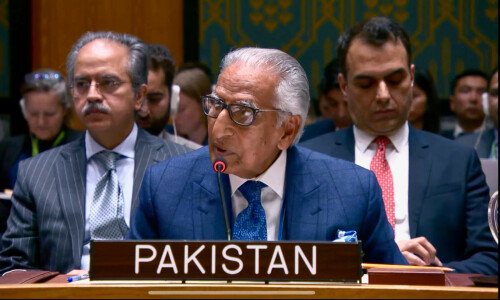ISLAMABAD: Addressing the pressing need arising from the swiftly changing factors impacting child rights in Pakistan, the National Commission on the Rights of Child (NCRC) unveiled a forward-thinking three-year strategic plan and a policy brief on child trafficking.
This initiative was a result of a comprehensive desk review and consultative process with key stakeholders, child rights experts and voices from civil society.
In a statement, the NCRC said its strategic vision was anchored in the promise of upholding the rights of every child. By the year 2026, the strategic plan aimed to deliver a measurable improvement in the enforcement of child rights, making every effort that this promise is translated into evidence-based actions by state entities and civil society.
The NCRC said the key priority outlined in the plan was the focus on evidence generation and knowledge.
The commission aimed to build a robust foundation of evidence-based practices, equipping policymakers and stakeholders with the insights needed to inform impactful policies and interventions.
Emphasising collaboration as a cornerstone, the NCRC’s strategic plan prioritised partnerships with diverse stakeholders. The collaborative approach recognised the collective responsibility of all sectors to protect and promote the rights of children in Pakistan. During the launch, NCRC chairperson Ayesha Raza Farooq emphasised the potential impact of the strategic plan.
“This is not just a roadmap. It is a commitment to transform the destiny of our children. By implementing evidence-based strategies and fostering partnerships, we aim to actively enforce the rights of every child in Pakistan,” Ayesha Raza Farooq said.
Speaking at the launching event, Member of the United Nations Committee on the Rights of the Child (UNCRC) Dr Rinchen Chophel said: “The commission’s strategic plan provides a roadmap for transformative actions. As a member of the UNCRC, I believe it will contribute significantly to shaping a future where the rights of every child are not only acknowledged but actively protected and promoted.”
Christine Chung, representing the UN Office of the High Commissioner for Human Rights, said: “In May 2023, Pakistan was subject to the first cycle of the universal periodic review, during which the government made commitments to work on recommendations from other member states that included combating child marriage and raising minimum age of marriage, promoting children’s right to quality education and combating child labour. Our office acknowledges that these recommendations have been translated into the strategic plan presented by the commission.”
Published in Dawn, January 25th, 2024














































